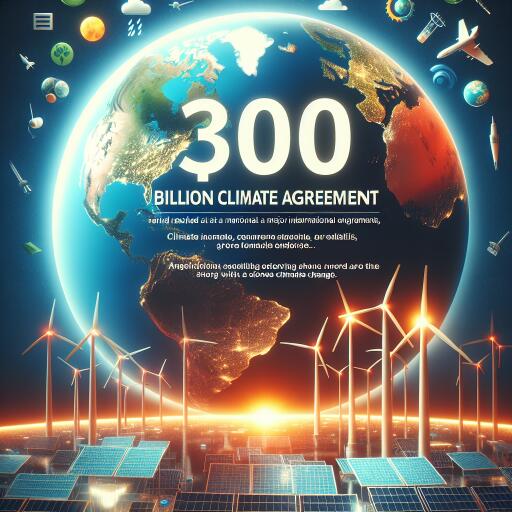
$300 Billion Climate Deal Reached at COP29
The United Nations Climate Change Conference, COP29, held in Baku, marked a substantial turning point when countries around the world consented to a bold and ambitious $300 billion annual funding target. This milestone financial commitment aims to aid the world’s less affluent nations as they grapple with the adverse effects of climate change.
In what became an extended session, the negotiations concluded in Azerbaijan’s capital with delegates setting a tone for continued international collaboration to combat the impending climate crisis, during a year that is on track to be the hottest historically recorded.
The United Nations climate leadership recognized the challenging discussions that paved the way for this agreement. The outcome is viewed not merely as a financial plan, but as humanity’s protective shield against the escalating threats of climate change. It aims to sustain the momentum of the clean energy revolution and safeguard millions across the globe.
“It has been a difficult journey, but we’ve delivered a deal. This deal will keep the clean energy boom growing and protect billions of lives,” emphasized the climate chief.
The pact entails delivering $300 billion each year by 2035. This robust figure significantly enhances the previous pledge of $100 billion annually by 2020—a target that was only achieved belatedly in 2022 and is due to expire in 2025.
This groundbreaking agreement also sets a strategic direction for the forthcoming climate summit, scheduled to take place in Brazil’s Amazon rainforest. There, nations will chart the course for climate action over the coming decade, outlining measures to mitigate and adapt to climate impacts.
Besides the financial commitments, countries concurred on establishing regulations for a global marketplace that facilitates the trade of carbon credits. Champions of this marketplace project believe it could channel additional billions into innovative initiatives aimed at combating global warming, such as afforestation and the wider adoption of clean energy technologies.
The negotiations, initially slated to conclude by the week’s end, extended past the deadline as nearly 200 nations strove to reach a unified resolution—reflecting the complexities inherent in addressing global climate financing.
This financial intervention for developing nations comes at a critical juncture. Scientific forecasts suggest the year may culminate as the hottest on record, underscoring the urgent need for actionable climate strategies. The world continues to witness the severe consequences of climate change; catastrophic floods have decimated regions across Africa; lethal landslides have engulfed towns in Asia; and in South America, droughts have reduced rivers and affected countless communities.
Not even the developed world stands immune. In recent months, extreme weather has wreaked havoc globally, with Valencia, Spain, suffering from devastating floods that claimed over 200 lives, while the United States has already experienced an alarming number of billion-dollar disasters, just shy of the previous year’s total.
The COP29 agreement symbolizes a significant leap towards climate resilience and adaptation, promising a cooperative future for nations to jointly abate the multifaceted challenges posed by the rapidly changing climate. As the groundwork is set, the global focus now shifts towards implementing these promises and evaluating impacts in real-time.





Leave a Reply